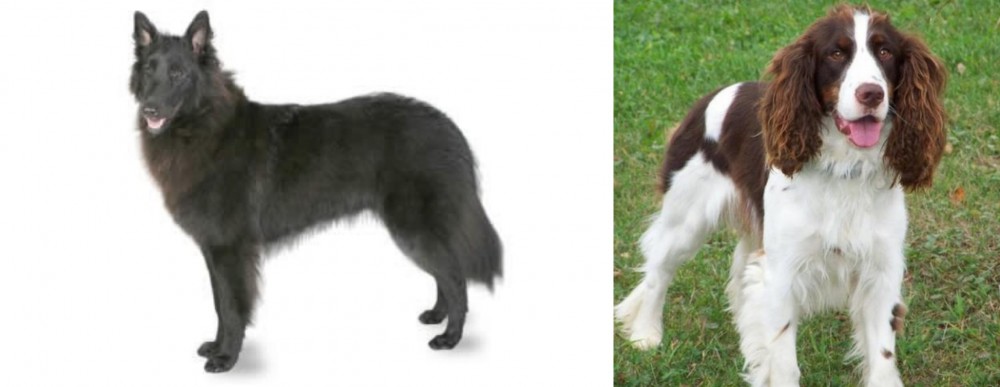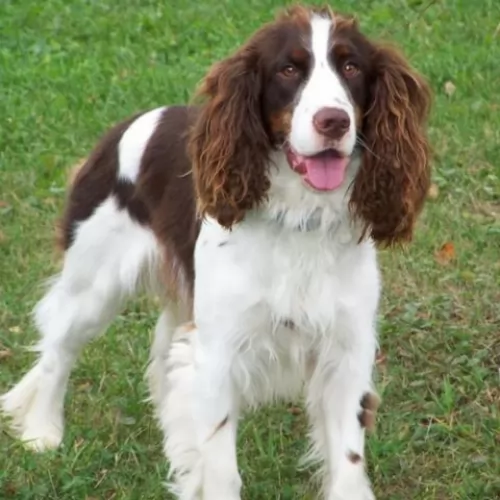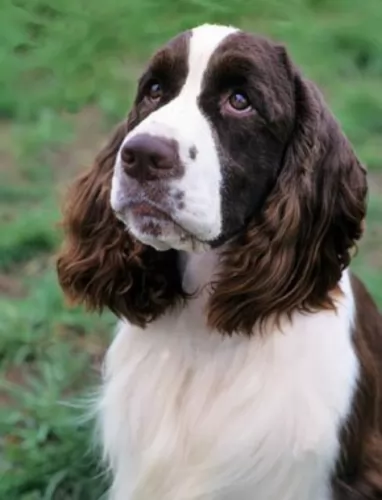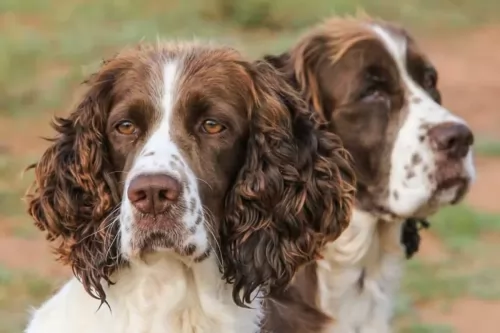 Petzlover
Petzlover Belgian Shepherd is originated from Belgium but English Springer Spaniel is originated from United Kingdom. Belgian Shepherd may grow 15 cm / 6 inches higher than English Springer Spaniel. Both Belgian Shepherd and English Springer Spaniel are having almost same weight. Both Belgian Shepherd and English Springer Spaniel has same life span. Both Belgian Shepherd and English Springer Spaniel has same litter size. Belgian Shepherd requires Moderate Maintenance. But English Springer Spaniel requires Low Maintenance
Belgian Shepherd is originated from Belgium but English Springer Spaniel is originated from United Kingdom. Belgian Shepherd may grow 15 cm / 6 inches higher than English Springer Spaniel. Both Belgian Shepherd and English Springer Spaniel are having almost same weight. Both Belgian Shepherd and English Springer Spaniel has same life span. Both Belgian Shepherd and English Springer Spaniel has same litter size. Belgian Shepherd requires Moderate Maintenance. But English Springer Spaniel requires Low Maintenance
 There are different varieties of the Belgian Shepherd Dog – but these all differ only in color, length and texture of coat. The interesting aspect of the names of the different Belgian Shepherds, is that the names of the different varieties are taken from the individual towns in Belguim from which each variety comes from.
There are different varieties of the Belgian Shepherd Dog – but these all differ only in color, length and texture of coat. The interesting aspect of the names of the different Belgian Shepherds, is that the names of the different varieties are taken from the individual towns in Belguim from which each variety comes from.
This breed dates back to the middle ages, but it was only in 1891 that Professor A. Reul of the Cureghem Veterinary Medical School established standards for the types and actually separated- and distinguishing them. In the UK they are shown as one breed.
 The English Springer Spaniel is one of many gun dog breeds that flush and retrieve. They descended from the Shropshire Spaniels and Norfolk Spaniels. The English Springer Spaniel is somewhat similar to the Welsh Springer Spaniel and believe it or not they are also closely related to the English Cocker Spaniel. In the last century the cockers and springers came from the same parents. The larger dogs flushed game and made game “spring” from the brush while the smaller dogs – the “cockers” would hunt woodcock. Eventually through specific breeding, the UKC of England recognized the “springers” as a separate breed.
The English Springer Spaniel is one of many gun dog breeds that flush and retrieve. They descended from the Shropshire Spaniels and Norfolk Spaniels. The English Springer Spaniel is somewhat similar to the Welsh Springer Spaniel and believe it or not they are also closely related to the English Cocker Spaniel. In the last century the cockers and springers came from the same parents. The larger dogs flushed game and made game “spring” from the brush while the smaller dogs – the “cockers” would hunt woodcock. Eventually through specific breeding, the UKC of England recognized the “springers” as a separate breed.
Sydenham Edwards, in 1801, proposed that the spaniels be divided into the Springing or Hawking Spaniel and the Cocking or Cocker Spaniel. From this point on there was a flourish in the development of spaniel breeds in the 19th century. They were usually named for the county in which they were founded or after the individual who developed them. In 1902, the English Springer Spaniel was officially recognized as its own breed by the UKC. It was not until 1910 that the AKC recognized them as well.
 The Belgian Shepherd is a well proportioned, muscular medium-to-large dog breed. There are the different varieties but they generally stands at 56 – 66cm in height and weighs anything from 25 to 30kg. You get the short haired Malinois and then you also get the Belgian Tervuren and the Groenendal which are fairly long-haired varieties. Their colour shades vary so you can find black with white markings on the chest and feet, you can find light to dark brown and some are even inclined to be brown.
The Belgian Shepherd is a well proportioned, muscular medium-to-large dog breed. There are the different varieties but they generally stands at 56 – 66cm in height and weighs anything from 25 to 30kg. You get the short haired Malinois and then you also get the Belgian Tervuren and the Groenendal which are fairly long-haired varieties. Their colour shades vary so you can find black with white markings on the chest and feet, you can find light to dark brown and some are even inclined to be brown.
All the varieties have long tails, pointed, fully erect ears and black noses. While the Belgian Shepherd isn’t an aggressive dog, he makes an excellent guard dog, being alert, highly energetic and intelligent and easy to train. As with most other dogs, you’ll want to see to it that he is trained and socialized because then he makes a super pet suited to life with a family where there are children and other pets. He has an independent nature and is loyal and protective with his human family.
 Among spaniels the English Springer is medium size and well compacted. Both the working dog and the show dog sport moderately long coats and a friendly tail. They both wear a gentle expression in their eyes. But there the commonality stops as the difference between the working English Springer Spaniel and the show line is greater in this breed than in any other. The gene pools have become almost separate over the last 70 years. If you put a field dog in the show ring they would not be able to compete. If you put a show line English Springer in the field, they would not have the stamina or speed for field trials.
Among spaniels the English Springer is medium size and well compacted. Both the working dog and the show dog sport moderately long coats and a friendly tail. They both wear a gentle expression in their eyes. But there the commonality stops as the difference between the working English Springer Spaniel and the show line is greater in this breed than in any other. The gene pools have become almost separate over the last 70 years. If you put a field dog in the show ring they would not be able to compete. If you put a show line English Springer in the field, they would not have the stamina or speed for field trials.
The field line has a coarser coat and less pendulous ears. They may dock a few inches off the tail, and they are much scruffier than the show dogs. On the other hand, the show dogs have dewlaps, pendant ears and dangling flews. They are heavier and thicker than the field dog. They have long muzzles, not so prominent eyes and docked tails. The English Springer Spaniel stands tall and proud, coming from an ancient line of Spaniels
 Energy is a big factor with this beautiful dog, so before you consider one as a pet, be sure that you can take care of his exercise needs. He belongs to the working group of dogs so he won’t enjoy just lazing around day after day. He is wired to be herding livestock and that natural instinct doesn’t disappear once he becomes a pet in your home. With so much energy, he wants a nice sized garden and wouldn’t do well cooped up indoors at all.
Energy is a big factor with this beautiful dog, so before you consider one as a pet, be sure that you can take care of his exercise needs. He belongs to the working group of dogs so he won’t enjoy just lazing around day after day. He is wired to be herding livestock and that natural instinct doesn’t disappear once he becomes a pet in your home. With so much energy, he wants a nice sized garden and wouldn’t do well cooped up indoors at all.
He is a strong, loving dog, and in exchange for your care of him, he will be a loyal, loving, protective friend who will love you to the end.
 The English Springer Spaniel is a friendly dog who loves to please his people. They are great family dogs, easy-going and affectionate. In addition, they are attentive and alert which makes them such great hunting dogs. With exceptional speed and stamina, he needs activity to stimulate his body and brain. He is very intelligent. That intelligence can lead to stubbornness as well. He’d great with kids and good with other pets with perhaps the exception of cats. The breed is in love with water and will get in at any time.
The English Springer Spaniel is a friendly dog who loves to please his people. They are great family dogs, easy-going and affectionate. In addition, they are attentive and alert which makes them such great hunting dogs. With exceptional speed and stamina, he needs activity to stimulate his body and brain. He is very intelligent. That intelligence can lead to stubbornness as well. He’d great with kids and good with other pets with perhaps the exception of cats. The breed is in love with water and will get in at any time.
 The Belgian Shepherd is a hardy dog so if you do your part to provide him with good quality nutrition from the food he eats and you exercise him, he’ll reach the 10-14 years allotted to him.
Just like with any dog, there will be some minor concerns that you need to watch out for -
The Belgian Shepherd is a hardy dog so if you do your part to provide him with good quality nutrition from the food he eats and you exercise him, he’ll reach the 10-14 years allotted to him.
Just like with any dog, there will be some minor concerns that you need to watch out for -
epilepsy, eye problems, cancer, skin allergies and hip dysplasia.
remember to check his teeth and for ticks and parasites as both, if just left, can jeopardise his health seriously.
see that he get his first puppy vaccinations at 6 to 8 weeks of age.
 Not an uncommon issue for most medium to smaller sized dogs. It can lead to lameness or arthritis.
Not an uncommon issue for most medium to smaller sized dogs. It can lead to lameness or arthritis.
Loss of vision due to a deterioration of the retina.
Clubs form in the retinal tissue and can lead to blindness.
The twisting or distention of the stomach that effects dogs with deep chests and can lead to death if not treated immediately.
 Your Belgian Shepherd is an energetic dog breed who is social and who wants to be included in your family activities. You can’t just keep him cooped up in your back yard and expect him to do well. He’ll need daily exercise – walks, swims if there is water close by, chasing the ball as well as your companionship.
Your Belgian Shepherd is an energetic dog breed who is social and who wants to be included in your family activities. You can’t just keep him cooped up in your back yard and expect him to do well. He’ll need daily exercise – walks, swims if there is water close by, chasing the ball as well as your companionship.
These dogs are shedders so you’ll certainly be needing to watch your clothes for hairs. You will need to give them a good brush at least twice a week to get rid of all that loose hair and to keep his coat shiny and in tip top condition. Also, he likes the closeness the brushing provides between him and his human caretaker.
The Belgian Shepherd is a robust, healthy breed of dog, but many ill dogs are brought to veterinary clinics because they are suffering with itchy skin problems, they have digestive problems and they’re generally run down. This is because they aren’t provided with a varied and balanced diet plan. Apart from eating a quality dry- or wet dog food as recommended by your vet, he’ll most certainly need some raw meat in his diet too.
 The English Springer Spaniel can gain weight easily and obesity is one of the biggest health issues for this breed. Feed them a high quality dry dog food. Working dogs need more energy and more calories than the inactive dog. An active member of the breed should have around 1353 calories every day in at least 2 meals if not 3. Do not feed a large meal before or after strenuous exercise as this can cause bloat.
The English Springer Spaniel can gain weight easily and obesity is one of the biggest health issues for this breed. Feed them a high quality dry dog food. Working dogs need more energy and more calories than the inactive dog. An active member of the breed should have around 1353 calories every day in at least 2 meals if not 3. Do not feed a large meal before or after strenuous exercise as this can cause bloat.
In addition to the health issues listed above the English Springer Spaniel is also prone to:
This is a genetic condition where the body cannot use the carbohydrates it takes in and convert it to energy. This is identified as a blood disorder.
Causes seizures but can be treated with medications.
With longer , droopy ears, infection is always a possibility. Clean them regularly and keep them dry.
The working English Springer Spaniel is a very energetic dog requiring daily exercise and loving to play. They love walks and hikes. They can excel in competitions such as rally, agility, tracking, field and obedience.